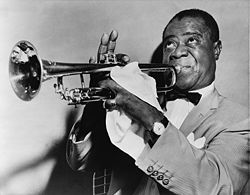
Listen
Louis Armstrong version
White Stripes version
About
“St. James Infirmary Blues” is an American folksong of anonymous origin, though sometimes credited to the songwriter Joe Primrose (a pseudonym for Irving Mills). Louis Armstrong made it famous in his influential 1928 (0r 1929?) recording. “St. James Infirmary Blues” is based on an 18th-century traditional English folk song called “The Unfortunate Rake” (also known as “The Unfortunate Lad” or “The Young Man Cut Down in His Prime”), about a soldier who uses his money on prostitutes, and then dies of a venereal disease.
Trivia
- The title is said to be derived from St. James Hospital in London, a religious foundation for the treatment of leprosy. There is some difficulty in this since it was closed in 1532 when Henry VIII acquired the land to build St. James Palace. Another possibility is the Infirmary section of the St James Workhouse which was opened in 1725 by the St James Parish in Poland Street, Piccadilly and continued well into the nineteenth century. This St James Infirmary was contemporaneous with the advent of the song.
- Variations typically feature a narrator telling the story of a young man “cut down in his prime” (occasionally, a young woman “cut down in her prime”) as a result of morally questionable behaviour. For example, when the song moved to America, gambling and alcohol became common causes of the youth’s death.
- More recently, The White Stripes cover the song on their self-titled debut album, as does Van Morrison on What’s Wrong with This Picture?, and actor Hugh Laurie on his 2011 album Let Them Talk. Isobel Campbell has also recorded a version of the song.
